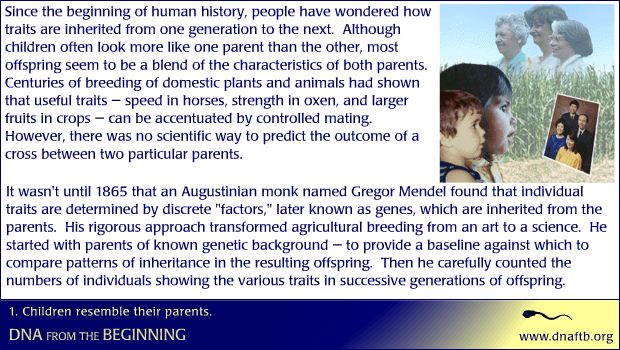Children Resemble Their Parents

Since the beginning of human history, people have wondered how traits are inherited from one generation to the next.
"Since the beginning of human history, people have wondered how traits are inherited from one generation to the next. Although children often look more like one parent than the other, most offspring seem to be a blend of the characteristics of both parents. Centuries of breeding of domestic plants and animals had shown that useful traits - speed in horses, strength in oxen, and larger fruits in crops - can be accentuated by controlled mating. However, there was no scientific way to predict the outcome of a cross between two particular parents. It wasn't until 1865 that an Augustinian Monk named Gregor Mendel found that individual traits are determined by discrete "factors," later known as genes, which are inherited from the parents. His rigorous approach transformed agricultural breeding from an art to a science. He started with parents of known genetic background - to provide a baseline against which to compare patterns of inheritance in the resulting offspring. Then he carefully counted the numbers of individuals showing the various traits in successive generations of offspring."
augustinian monk, patterns of inheritance, domestic plants, plants and animals, genetic background, human history, offspring, 1865, genes, crops, generations, Gregor Mendel, traits, agricultural breeding
- ID: 16142
- Source: DNALC.DNAFTB
Related Content
16151. Biography 1: Gregor Mendel (1822-1884)
Father of Genetics
16170. Genes don't blend.
DNAFTB Animation 3: Gregor Mendel explains that breeding short and tall pea plants didn't produce a medium-sized plant.
16167. Biography 2: Gregor Mendel (1822-1884)
The Man, the Monk
16190. Some genes are dominant.
DNAFTB Problem 4: Cross pure-bred pea plants to identify dominant flower color.
16168. Problem 2: Genes come in pairs
Repeat Mendel's experiments with an eighth trait.
16182. Some genes are dominant.
DNAFTB Animation 4: Gregor Mendel explains the rules of inheritance.
16189. Biography 4: Gregor Mendel (1822-1884)
The Unappreciated
16172. Gallery 3: Gregor Mendel Manuscript, 1865
First page of Mendel's paper (German), Experiments in Plant Hybridization, in his handwriting, 1865.
16180. Genes don't blend.
DNAFTB Problem 3:Breed pea plants to observe flower color.
16224. Biography 6: Erich von Tschermak-Seysenegg (1871-1962)
Hugo de Vries, Carl Correns and Erich von Tschermak-Seysenegg were the three scientists who rediscovered Mendel's laws in 1900.












